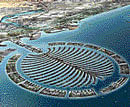Dubai crash: Is it a rags-to-riches-to-rags story?

At the grand opening of the Dubai air show this month, the crown prince of Abu Dhabi, Sheik Muhammad bin Zayed al-Nahyan, placed his hand over the hand of Dubai’s ruler, Sheik Mohammed bin Rashid al-Maktoum. That was widely viewed among people here as a sign that Abu Dhabi, by far the largest and richest member-state of the UAE federation, would take care of Dubai.
The question now is whether that means Abu Dhabi will use its wealth to bail out Dubai, the deeply indebted city-state that shook world markets when it announced that its chief investment arm would not be able to pay its debts on time.
Dubai is famous as the brash, secular upstart of the emirates, and Abu Dhabi is known as the religious and conservative big brother. Tensions between the two are legion, but when reporters questioned Sheik Mohammed about tensions last week, he told them to “shut up.”
Nevertheless, the debt crisis of the last few days has fed speculation that Abu Dhabi would impose conditions for any bailout, including a stake in prominent Dubai enterprises like Emirates Airlines. Emirati officials have denied those rumours.
The UAE’s central bank issued a statement on Sunday saying that it would stand behind foreign and domestic banks operating in the emirates. It did not mention Dubai World, the investment arm of the Dubai government, which is $59 billion in debt. Analysts say the statement will not be enough to allay fears that the Dubai government could default on part of its sovereign debt.
Still, as fear from Dubai’s debt crisis circled the globe, an unaccustomed quiet settled here at the centre of the storm — and it was more than just the hush of the Id al-Adha holiday. Expatriate bankers and other professionals here are simmering in anxiety, as the world talks about Dubai like a bad seed of the global economy.
“A lot of people are pretty freaked out,” said one American businessman with long experience in the region, on condition of anonymity.“They’re all watching CNN and going: ‘Is Dubai going to default?’ ”
“Only a few decades ago, this country was nothing, just a desert,” said Thani al-Falaasi, a 31-year-old Emirati businessman who was shopping with a friend on Sunday night in the Dubai Mall. Referring to Dubai’s leader, Sheik Mohammed, he said: “He built it up. Even if there is a crisis, he can solve it. We have great confidence in him.”
That is not the view from elsewhere in the emirates. Like Dubai’s bankers and bondholders, the government of the UAE was surprised by Dubai’s announcement that it would need to freeze repayments on the debt of its chief investment arm, Dubai World.
Abu Dhabi, which has more oil than Dubai and no cash problems, could wipe out Dubai World’s $59 billion in debt easily, analysts say.
But that seems unlikely. Despite the announcement by the emirates’ central bank that it would make more money available to local and foreign banks in Dubai, analysts say such imprecise promises — the bank did not say how much, or that it would back all the debt of Dubai or Dubai World — may not be enough to placate investors.
More debts
Many have been left wondering, again, if the Emirate’s debts are worse than most of the world suspects. Analysts estimate Dubai’s total debt at around $80 billion, but some here say it could well be closer to $120 billion or more.
Dubai’s rags to riches, and possibly back to rags, tale “has all the elements of a Greek tragedy,” said Jan Randolph, head of sovereign risk at Global Insight, a London research company, with “hubris and pathos” in equal measure. The operative question is whether Abu Dhabi and the UAE federation will rescue Dubai from the consequences of its profligacy.
If it does not, the secondary effects could spread to Greece, Britain and some Baltic states, all heavily indebted nations, or to India and the Philippines, where foreign workers in Dubai send back millions to support family each year, or to any corner of the market for credit that individuals, companies and countries all rely on.
Inside Dubai, the crisis has brought to the fore fears and resentments that the legion of foreign workers who make up 90 per cent of Dubai’s population have long held toward the small minority of Emiratis who own the place.
Expatriates here have complained for years that Dubai is too secretive about its debt and finances and that its rapid growth came at the expense of accountability.
“It breeds further distrust,” said John McGaw, a senior adviser to Golden Oryx, an Abu-Dhabi business development company. “A lot of people have been disappointed with the way they have been treated over the past 12 to 18 months.”